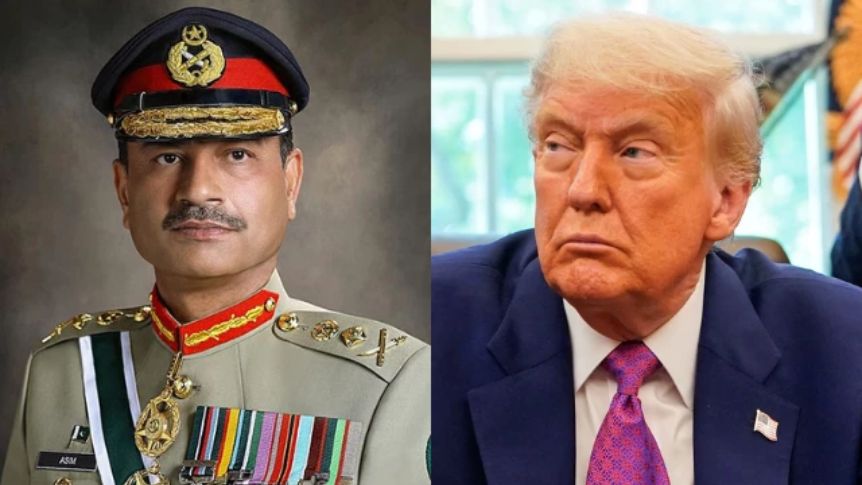WASHINGTON – In a rare and unprecedented diplomatic development, Pakistan’s Chief of Army Staff (COAS) General Syed Asim Munir was formally hosted by former US President Donald J. Trump at the White House on Tuesday, marking the first-ever official visit of a serving Pakistani army chief to the executive residence of a sitting or former American head of state.
The high-profile engagement took place in the White House Cabinet Room and lasted over two hours. Diplomatic sources confirmed that a wide-ranging strategic dialogue was held over lunch, covering regional peace, military cooperation, and the geopolitical realignment underway in South Asia.
According to the White House press pool, the meeting was initiated on President Trump’s request to “thank the General for avoiding war with India,” referring to the volatile standoff that unfolded along the Line of Control in May. President Trump hailed General Munir’s leadership as “pivotal” in averting a full-scale conflict.
“We avoided a war, and that deserves recognition. General Munir and his leadership helped keep the peace. That matters,” Trump stated during a post-lunch briefing.
Regional and Strategic Focus
Diplomatic insiders revealed that the luncheon was more than a ceremonial exchange. Key issues discussed included:
- Regional de-escalation with India
- Counterterrorism cooperation, particularly against ISIS-K and TTP
- Pakistan’s evolving role in Gulf security and Iranian diplomacy
- Emerging discussions on bilateral trade, critical minerals, and fintech oversight
While no formal communiqué was issued, both sides reportedly agreed to pursue further dialogue through backchannel and official routes.
India reacts cautiously
Indian officials downplayed the White House engagement, asserting that the May ceasefire had been the result of direct military-to-military coordination between India and Pakistan, and not mediated by any third party.
However, US officials present at the meeting contended that Washington played a “quiet but critical role” in reducing tensions. The visit has led to renewed speculation about the United States recalibrating its South Asia policy amid growing ties with both India and Pakistan.
Strategic optics and implications
The historic nature of the meeting has not gone unnoticed in diplomatic and defense circles.
Political analysts suggest that the lunch served as both a symbolic and strategic gesture—signaling the revival of U.S.–Pakistan military-to-military relations at a time when China’s influence in the region is on the rise.
“This is not just about optics—it’s about realignment,” said a senior Washington-based South Asia expert. “General Munir’s visit to the White House signals that Islamabad is once again being viewed as a pivotal player in the region.”
A turning point?
Observers believe the luncheon could pave the way for broader strategic engagement. President Trump reportedly expressed interest in promoting future economic dialogue, including the possibility of trade agreements involving both India and Pakistan.
While the immediate outcome of the meeting remains unofficial, the implications are significant. It is expected that Islamabad will leverage the visit to bolster its diplomatic image and reinforce its international standing.
The Inter-Services Public Relations (ISPR) has yet to issue a formal statement.


